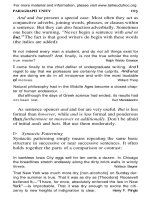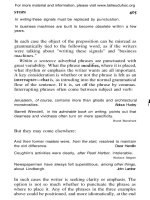Essential guide to writing part 11
Bạn đang xem bản rút gọn của tài liệu. Xem và tải ngay bản đầy đủ của tài liệu tại đây (284.79 KB, 15 trang )
IV
The Sentence
For more material and information, please visit www.tailieuduhoc.org
CHAPTER
18
The Sentence: A
Good sentences are the sinew of style. They give to prose its
forward thrust, its flexibility, its strong and subtle rhythms.
The cardinal virtues of such sentences are clarity, emphasis,
concision, and variety. How to achieve these qualities will be
our major concern in this part. First, however, we must
derstand, in a brief and rudimentary way, what a sentence is.
It is not easy to say. In fact, it is probably impossible to
a sentence to everyone's satisfaction. On the simplest
level it may be described as a word or group of words stand-
ing by itself, that is, beginning with a capital letter and ending
with a period, question mark, or exclamation point. (In speech
the separateness of a sentence is marked by intonation and
pauses.)
And yet an effective sentence involves more than starting
with a capital and stopping with a period. The word or words
must make sense, expressing an idea or perception or feeling
clear enough to stand alone. For example, consider these two
sentences:
The package arrived. Finally.
The first consists of a subject and verb. The second is only a
single word, an adverb detached from a verb (arrived). The
idea might have been expressed in one sentence:
For more material and information, please visit www.tailieuduhoc.org
THE SENTENCE
The package finally arrived.
The package arrived, finally.
Finally, the package arrived.
But we can imagine a situation in which a speaker or writer,
wanting to stress exasperation, feels that finally should be a
sentence by itself.
As that example indicates, there are sentences which con-
tain subjects and verbs and sentences which do not. The
kind arrived) is "grammatically complete" and
is the conventional form sentences take in composition. The
second type of sentence {Finally in our example) does not
contain a subject and verb and is called fragment. Fragments
are more common in speech than in writing, but even in for-
mal composition they have their place, which we'll consider
in a subsequent chapter.
The Grammatical Sentence
The grammatically complete sentence is independent, con-
tains a subject and a predicate, and is properly constructed.
That definition may sound a bit formidable, but it really isn't.
Let's briefly consider each of those three criteria.
Grammatical Independence
Grammatical independence simply means that the words con-
stituting the sentence are not acting as a noun or modifier or
verb in connection with any other word or words. For ex-
ample, Harry was late is independent. Became Harry was late
is not. Because turns the words into an adverb (more exactly,
an adverbial clause). The construction should modify another
verb or clause as in The men were delayed in starting because
Harry was
1. The fact that Because Harry was late is not independent does not mean it
cannot serve as a sentence. In the right context it could effectively stand alone.
But it would be a fragment.
For more material and information, please visit www.tailieuduhoc.org
A DEFINITION
To take one more case. They failed to agree is a grammatical
sentence. That they failed to agree is not. It is a noun clause
and could function as the subject of a verb:
That they failed to agree was unfortunate.
Or as the object of one:
We know that they failed to agree.
Subject and Predicate
The heart of a grammatical sentence is the subject and pred-
icate. In a narrow sense the subject is the or words
identifying who or what the sentence is about, and the pred-
icate is the verb, expressing something about the subject. In
a broader sense, the subject includes the subject word(s) plus
all modifiers, and the predicate includes the verb together
with its objects and modifiers. For instance in The man who
lives next door decided last week to sell his the narrow,
or grammatical, subject is man, and the narrow, or grammat-
ical, verb is decided. The broad, or notional, subject is The
man who lives next door, and the broad, or notional, predicate
is decided last week to sell his house.
The verb in a grammatical sentence must be finite, that is,
limited with reference to time or person or number. English
has several verb forms called participles and infini-
tives for example, and to be). These can refer to any
interval of time and can be used with any person or with
either number. But by convention these nonfinite forms can-
not by themselves make a sentence. Thus Harry was late is a
grammatical sentence, but Harry being late isn't because it
contains only the participle being instead of a finite form such
as was.
Proper Construction
Even though a group of words is grammatically independent
and contains a subject and a finite verb, it will not qualify as
For more material and information, please visit www.tailieuduhoc.org
I THE SENTENCE
a grammatical sentence unless it is put together according to
the rules. "Rules" here does not mean regulations arbitrarily
laid down by experts. It means how we, all of us, use English.
Thus Harry late was is not a good sentence. We simply do
not arrange these words in that order.
Here's one other example of a nonsentence resulting from
bad construction:
Harry was late, and although he was sorry.
And can only combine elements that are grammatically
or more subjects of the same verb, for instance.
In this case and joins two unequal inde-
pendent clause Harry was late and the dependent (adverbial)
clause although he was sorry. The construction can be turned
into a legitimate grammatical sentence in either of two ways:
Harry was late, although he was sorry.
Harry was late, and he was sorry.
The Building Blocks
The basic slots of a grammatical is, the subject,
verb, object, and be filled by many kinds of
words, phrases, and dependent clauses, the building blocks of
sentences.
Phrases and dependent clauses are both functional word
or more words acting collectively in a gram-
matical function, as a subject, for instance, or direct object or
adverb, and so on. Functional word groups are enormously
important. They enable us to treat ideas too complex to be
expressed in single words as though they were, grammatically,
only one word. Take these two sentences:
know Susan.
know that you won't like that movie.
For more material and information, please visit www.tailieuduhoc.org
A DEFINITION
Susan is the direct object of know. So is that you won't like
that movie. For purposes of grammar the six-word clause
functions like the one-word proper noun. Being able to use
the full range of functional word groups available in English
is essential to writing well. Here is a quick summary.
Phrases
A phrase is a functional word group that does not a
subject-finite verb combination, although some phrases do
use nonfinite verb forms. We can distinguish five kinds of
phrases: verb, prepositional, participial, gerundive, and
infinitive.
A verb phrase is a main verb plus any auxiliaries:
They have been calling all day.
A prepositional phrase consists of a preposition (in, of, to, and
so on) plus an object, plus (often though not invariably) mod-
ifiers of the object:
Three people were sitting on the beautiful green lawn.
The chief function of prepositional phrases is to modify,
either as adjectives or as adverbs. A participial phrase is
constructed around a participle, usually in the present (run-
ning, for example) or past (run) participle form. It acts as an
adjective:
The man running down the street seemed suspicious.
Here the participial phrase modifies man. A gerundive phrase
also uses the present participle but in a construction that func-
tions as a noun. In the following example the gerundive
phrase is the subject of the verb phrase can be:
Running for political office can be very expensive.
For more material and information, please visit www.tailieuduhoc.org









